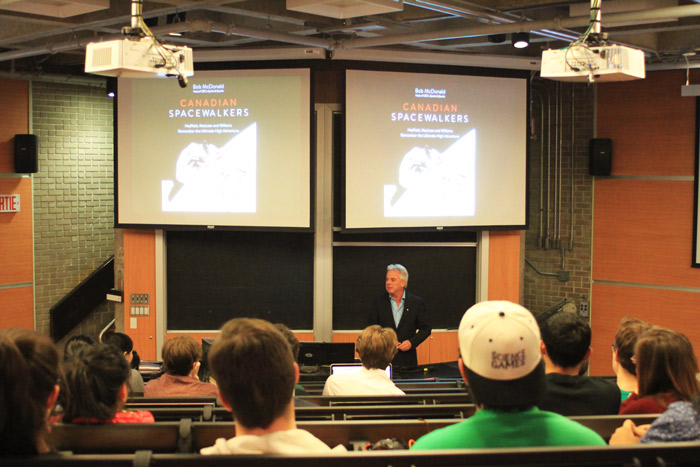Bob McDonald, host of CBC’s weekly podcast Quirks and Quarks, kicked off the Science Undergraduate Society’s (SUS) Academia week with a special presentation about Canadian spacewalkers.
Growing up at the height of the space age, McDonald’s fascination with space exploration was clearly apparent. He’s chronicled the lives of three Canadian astronauts in his book, Canadian Spacewalkers, and at the presentation, spoke about space with infectious enthusiasm.
“We need flexibility [in space suits] because there’s good skiing on Mars,” McDonald explained. “Both the North and South poles of Mars are covered in snow. It’s dry ice snow, made from carbon dioxide, so when you fall and get covered in it you don’t get wet. It just evaporates away.”
McDonald, a skilled storyteller, makes science relatable and entertaining. He can easily be described as one of the preeminent Canadian science journalists. After all, more than 500,000 listeners tune into Quirks and Quarks, where he has been the host for nearly 25 years. Though he has experienced great success in his career, McDonald explains that it hasn’t always been a smooth ride.
“I actually failed second year university,” he said. “I worked construction and drove a truck and I thought that was going to be my future.”
McDonald’s bracing authenticity is an important characteristic of his likable persona. More than once, he explained that the key to success is finding and taking advantage of opportunities. As a young adult, working at the Ontario Science Centre, McDonald talked his way into getting a media pass so that he could watch the Mars rover land at Mission Control in California.
“It’s been my exquisite pleasure to be a journalist during the time that we did go up there,” McDonald explained. “I took it upon myself to be [in California] when we went to the planets.”
Upon his return, Canada AM, CTV’s morning television news show asked him to come speak about his experiences watching the Mars landing firsthand in Mission Control.
“That’s the story of my life,” McDonald revealed. “Opportunities have come along and I took advantage of them and that’s why I’m here now.”
Despite McDonald’s unplanned career trajectory, there is considerable planning before every Quirks and Quarks show. While nearly all of his questions may have been prepared ahead of time, he maintains an organic and conversational tone in his interviews.
“We need good stories and good storytellers,” McDonald said. “We do a lot of massaging, so there’s work ahead of time in preparation for me to absolutely understand the story before I begin and then afterwards in the editing to make sure that it’s just really clear, [that] all of the information is there and you can understand it when you listen to it.”
McDonald also recruits scientists to Quirks and Quarks with the help of his three producers. As notoriously bad communicators, scientists are first screened and filtered by the team to make sure that they are able to effectively convey their research. In order to best represent the scientists’ story, McDonald needs to know all of the background information.
“By the time I get to the interview, I actually know all of the answers to the questions I’m asking,” he explained. “So my job is to listen, and make sure that I’m hearing the story that I already know.”
This formula, refined by McDonald and his producers, helps explain the award-winning success of Quirks and Quarks. Without visual aid from pictures, McDonald is able to conjure clear story arcs thanks to his, and his team’s, thorough preparation.
“There are no sharp corners,” McDonald stated. “You want to make the transition from one idea to the next as smooth as you possiblly can and bring the audience along with you and that’s what we do.”
Clarity is a concept that comes up often when talking to McDonald. His unlikely, and seemingly, contradictory coupling of enthusiasm and clarity have become his winning trademark. He offers some advice for future science journalists.
“If you want to host the show, you’ll have to crawl over my dead body,” he joked. “However, having said that, one of the things that I’ve found out in my work is that ideas are everything. Figure it out and get it done, it really works.”









